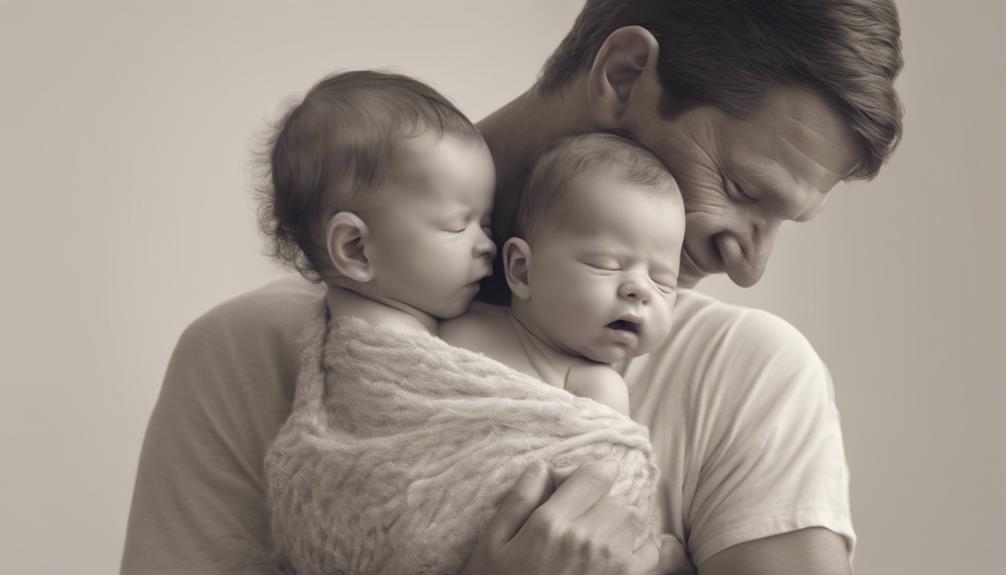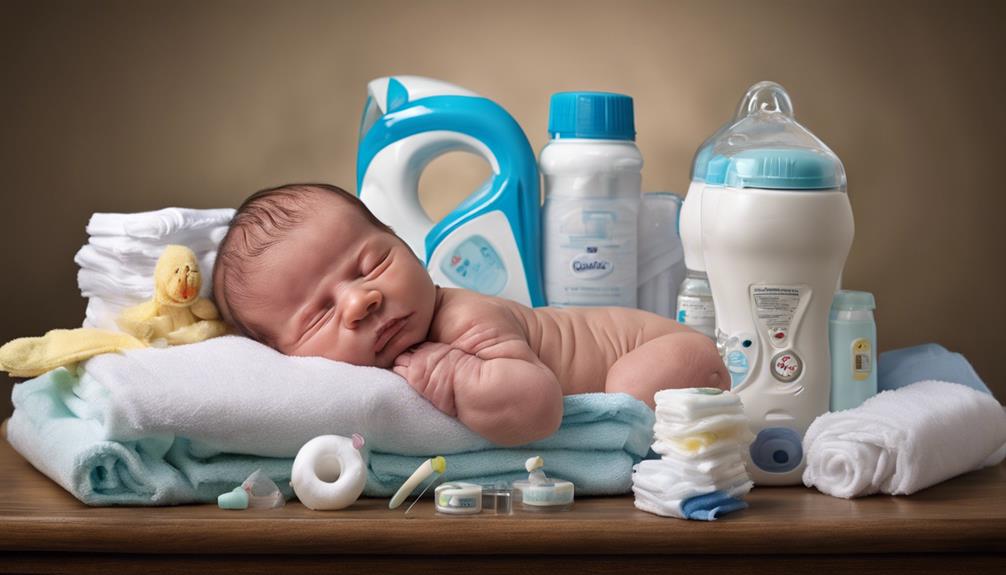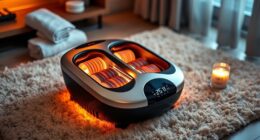Imagine you're sailing in calm waters, and suddenly, a gentle ripple disrupts the tranquillity. When your newborn experiences hiccups, it's akin to those unexpected ripples – a minor disturbance that can cause concern.
But fret not, for handling hiccups in your little one can be simpler than you think. There are effective strategies to ease these bouts, offering you peace of mind and your baby comfort.
So, let's navigate through the gentle waves of newborn hiccups together, ensuring smooth sailing ahead.
Key Takeaways
- Understand newborn hiccups are common and often resolve on their own.
- Recognize signs of discomfort and adjust feeding positions accordingly.
- Soothe hiccups with gentle techniques like back patting or changing baby's position.
- Prevent future hiccups by burping frequently and feeding in an upright position.
Understanding Newborn Hiccups
If your newborn is experiencing hiccups, understanding that this common occurrence is typically caused by the diaphragm's spasm, a muscle essential for breathing. Hiccups in newborns are quite normal and are often seen during or after feedings. These hiccups are believed to play a role in regulating your baby's breathing and strengthening the diaphragm. They usually stop on their own within a few minutes, so there's no need to worry too much.
To prevent hiccups in babies, you can try burping your baby more frequently during feedings to release any swallowed air that could be causing the hiccups. Keeping your baby in an upright position during and after feedings can also help. If the hiccups persist and seem to bother your baby, offering them a pacifier or gently rubbing their back can sometimes help alleviate the hiccups.
Recognizing Signs of Discomfort
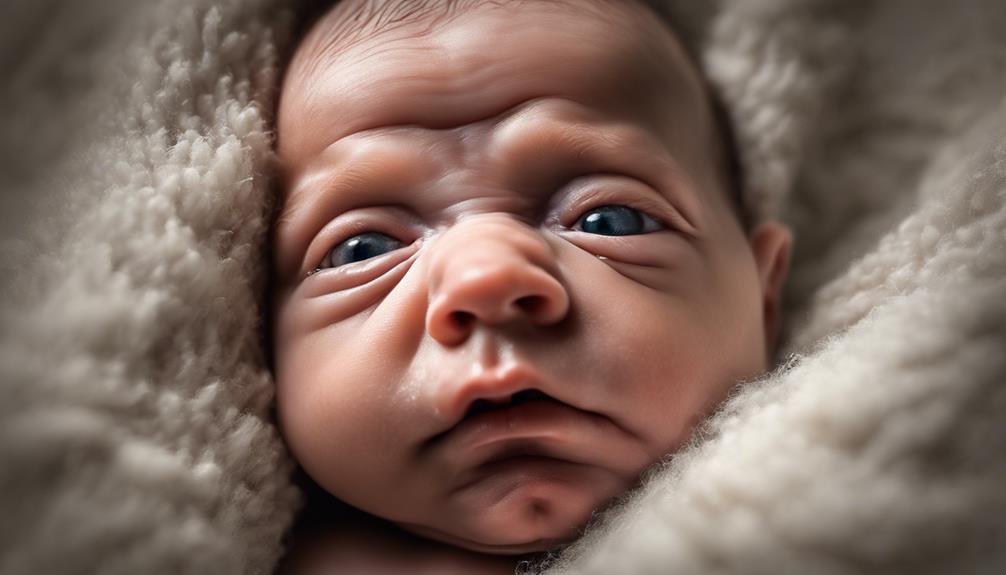
When your newborn is experiencing hiccups, pay close attention to any signs of discomfort they may display, such as fussiness or restlessness. It's crucial to recognize distress cues that your baby may exhibit during hiccups.
Here are some ways to help you identify if your newborn is uncomfortable:
- Monitor your baby's facial expressions for any signs of discomfort.
- Watch for arching of the back or pulling of legs towards the belly, which could indicate hiccups are causing distress.
- Keep an eye out for restlessness or agitation during hiccups.
- Consider adjusting feeding positions to ease any discomfort.
- Seek guidance from your healthcare provider if you notice persistent signs of distress associated with your newborn's hiccups.
Soothing Techniques for Hiccups

To help soothe your newborn's hiccups, gently pat or rub their back to relax the diaphragm. This simple act can often provide comfort and aid in alleviating the hiccups.
Offering a pacifier for your baby to suck on is another effective technique as sucking can help regulate their breathing pattern, potentially stopping the hiccups.
Changing your baby's position, such as holding them upright, can also help by adjusting the pressure on the diaphragm.
Ensuring your little one is in a calming environment with minimal distractions can promote relaxation and shorten the duration of the hiccups.
Keeping your baby comfortably swaddled or held in a secure position can further contribute to easing their discomfort.
Preventing Future Hiccups
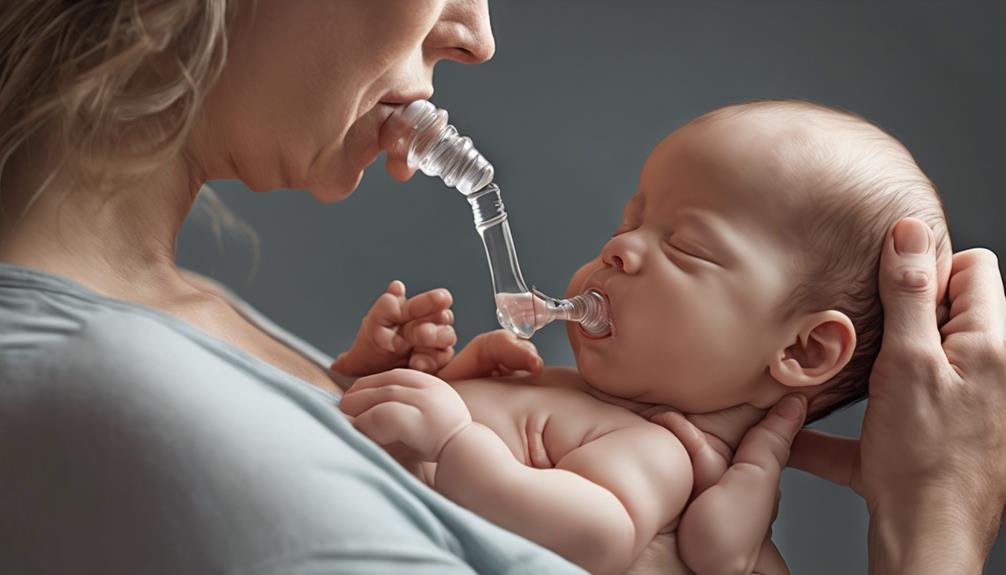
To prevent future hiccups in your newborn, focus on implementing simple practices during feeding and burping routines that can aid in reducing their occurrence. Here are some tips to help you prevent hiccups in your baby:
- Burp your baby frequently: Make sure to burp your baby during and after feeds to release trapped air and prevent hiccups.
- Feed in an upright position: Feeding your baby in an upright position can help reduce the likelihood of hiccups occurring.
- Maintain a calm environment: Ensuring a peaceful feeding environment and avoiding overfeeding can go a long way in preventing hiccups in newborns.
- Use proper bottle feeding techniques: Utilize the right nipple size and angle while bottle feeding to minimize air intake and decrease the chances of hiccups.
- Avoid extreme hunger or fullness: Make sure your baby isn't too hungry or too full before feeding to prevent hiccups in the future.
When to Seek Medical Advice

If your newborn's hiccups persist for an extended period or cause any concerning changes in behavior or appearance, it is advisable to seek medical advice promptly. When it comes to your little one's well-being, it's important to act on any signs that may indicate a need for medical attention. Here's a guide to help you understand when seeking medical advice for your newborn's hiccups is necessary:
| Signs to ponder for Seeking Medical Advice | When to Seek Help |
|---|---|
| Hiccups lasting 5-10 minutes or disrupting sleep/behavior | Contemplate consulting a healthcare provider |
| Skin color change to dusky or blue during hiccups | Seek immediate medical attention |
| Newborn appears uncomfortable or distressed | Contact a medical professional for guidance |
| Caution with home remedies for hiccups | Prioritize medical advice over unverified remedies |
| Contact a maternal child health nurse for reliable advice | Reach out to professionals for assistance and support |
Frequently Asked Questions
How Do You Stop Hiccups in a Newborn?
To stop hiccups in a newborn, try burping during and after feedings, offering smaller meals, keeping upright after feeding, patting their back gently, and avoiding laying flat right after eating. These steps can help alleviate hiccups effectively.
Is It OK to Lay Baby Down With Hiccups?
Sure, it's totally fine to lay your baby down with hiccups. They're usually harmless and won't affect their breathing. Just keep an eye on their comfort. If the hiccups bug you, a pediatrician can give peace of mind.
How Long Should Newborn Hiccups Last?
Newborn hiccups typically last 5-10 minutes. It's common for babies to hiccup multiple times daily. If hiccups persist for over 10-15 minutes, it might be wise to seek advice. Usually, hiccups resolve on their own and are not cause for concern.
What Is the Best Position for Baby Hiccups?
When your baby has hiccups, holding them upright against your chest, in a forward-leaning position on your lap, seated with a slight lean, or semi-upright on your shoulder, and gently patting their back can help relieve hiccups effectively.
Conclusion
To sum up, hiccups in newborns are common and usually nothing to worry about. Did you know that on average, newborns can experience hiccups multiple times a day?
Remember to stay calm, try soothing techniques, and consult a doctor if hiccups persist or seem to cause discomfort.
Your baby will likely outgrow this phase, so focus on enjoying those precious moments together.
You're doing a great job!
